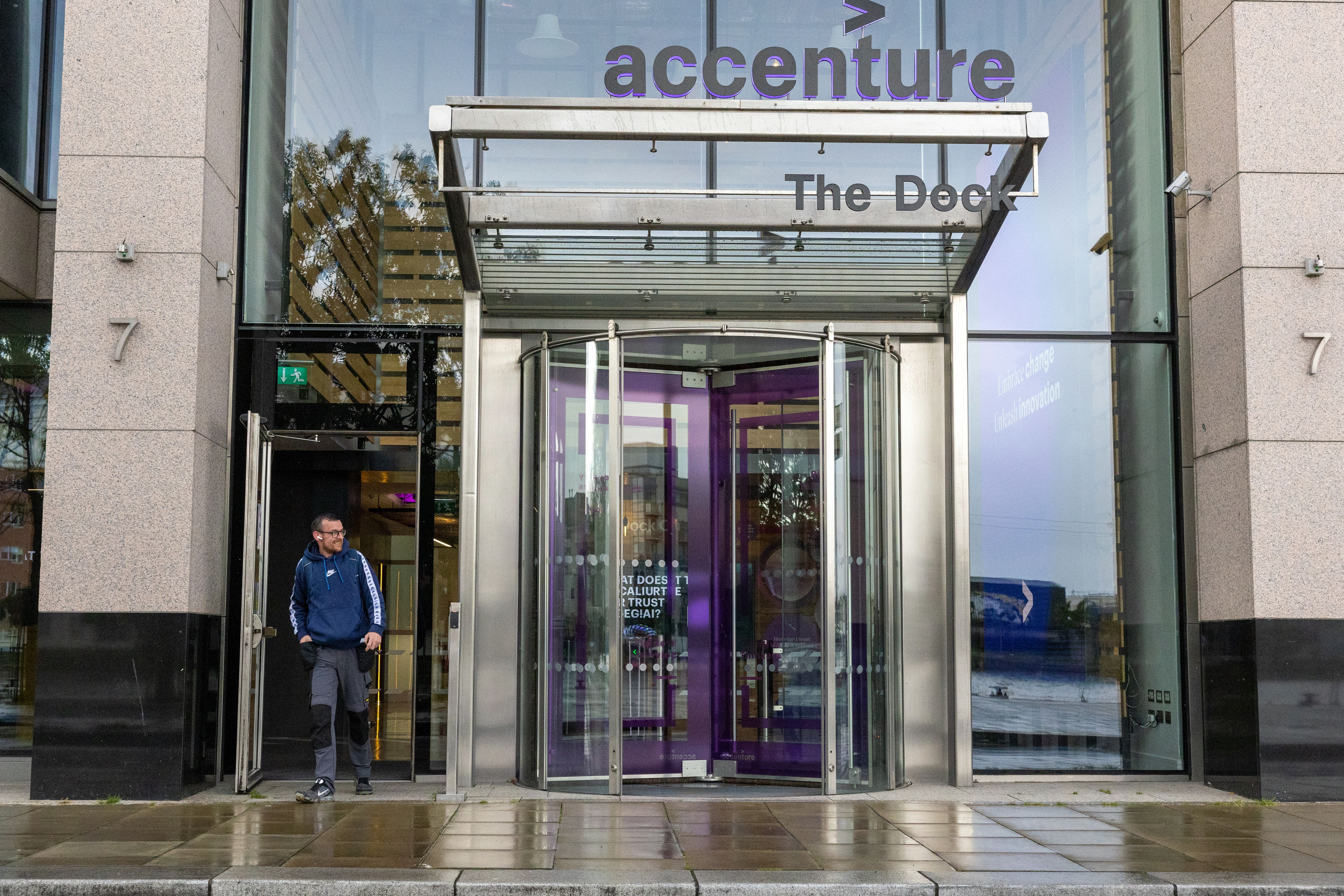Accenture urged to achieve job cuts through voluntary redundancies
The consultancy firm this week announced plans to reduce its headcount in Ireland by 890, on top of 400 job cuts earlier this year.

Consultancy firm Accenture should offer voluntary redundancy options as part of its plan to cut 890 jobs in Ireland, a minister has said.
The multinational company announced the major workforce reduction on Monday as part of ongoing streamlining of its global operations.
The firm had already cut 400 jobs from its 6,000-plus team in Ireland earlier this year.
Minister of state Sean Fleming urged Accenture to maximise the potential for voluntary redundancies to achieve the latest headcount reduction.
He said Monday’s announcement was one of the biggest single redundancy moves in Ireland in many years.
We remain firmly committed to our business in Ireland and will continue managing for the long term
Mr Fleming said the official notification to the Government from Accenture came as a “big shock”.
“It’s a big blow, especially to the people concerned and their families, and our thoughts are with them because many of them are wondering ‘Am I one of the 890 people that’s going to get the bad news over the next day or so out of the 6,000 people that work there?’,” he told RTE Radio One.
“Everybody in the business will be on tenterhooks until there is some clarity, and that’s why it’s most important that the company arrange the collective employee process straightaway so that there can be good information back to people.
“And they would raise the possibility that there might have been in the normal course of events, because of a lot of movement in the management consultancy sector, if people were contemplating moving to other positions or they were contemplating leaving the company, that people who want to volunteer to leave should be first, rather than everybody in that particular section being forced out, even if there is movement within the overall group.”
Mr Fleming expressed confidence that those who lose their jobs will find re-employment quickly.
“The IDA (Ireland’s investment and development agency) has created 6,000 new jobs already this year,” he said.
“We are at full employment in Ireland, with less than 4% unemployment – we’ve never experienced that in our lifetime.
“So, definitely the economy is strong, and the most important thing that the Government can do now – and the IDA will already be working on it – is the skills profile (of the departing workforce) because there will be other IDA clients in Ireland looking to employ people in the weeks and months ahead.
“The IDA have a particularly big role here to match the skills of those who are being made redundant with the requirements of other companies out there who are currently looking for new staff.”
Sinn Fein’s Louise O’Reilly also called for a “voluntary first” approach to making the cuts.
“What the company should be doing is talking directly to the workers as part of the consultation process and working hard to save every job,” she told RTE.
“So, if there is a chance that any of these 890 jobs can be saved, well, then it behoves the company and the workers to sit down.”
She added: “There has to be very clear criteria for selection for redundancy that should be negotiated directly with the workers.”
Ms O’Reilly said the Government needs to “get ahead” of such announcements and undertake an analysis of the tech sector and the impact of recent redundancy announcements.
“The Government need to be looking at these jobs because there does seem to be something of a kind of a snowball effect,” she said.
“There were 400 jobs (cut) after what Accenture called a very careful review.
“They laid off 400 people; now, a couple of months later, as those people who got the news in March are leaving their jobs, we find that there are up to nearly 900 jobs to go.
“So I think the Government needs to maybe try and get ahead of this rather than waiting for announcements, get a picture of the tech sector, how many jobs have been lost overall, how many people have been re-employed, how many people were here from other countries and went home, and what’s that doing to the profile of workers in that sector?”
Accenture, which has its headquarters in Dublin, has insisted it remains “firmly committed” to its Irish operations.
“We continue to focus on ensuring we have the right talent to serve our clients and run our business today and tomorrow,” the company said in a statement on Monday.
“In March, we initiated a series of actions to streamline our operations, including the departure of around 2.5% of our current global workforce.
“We will be commencing a collective employee consultation for a proposed redundancy programme that is expected to affect around 890 people at Accenture in Ireland.
“We do not plan to comment further while the consultation process is ongoing.
“Our business in Ireland continues to show strong performance and we remain focused on our strategy to be at the centre of our clients’ business and help them reinvent themselves to reach new levels of performance.
“We continue to focus on ensuring we have the right talent to serve our clients, to invest in our people and recruit in critical skills areas.
“We remain firmly committed to our business in Ireland and will continue managing for the long term.”
Bookmark popover
Removed from bookmarks